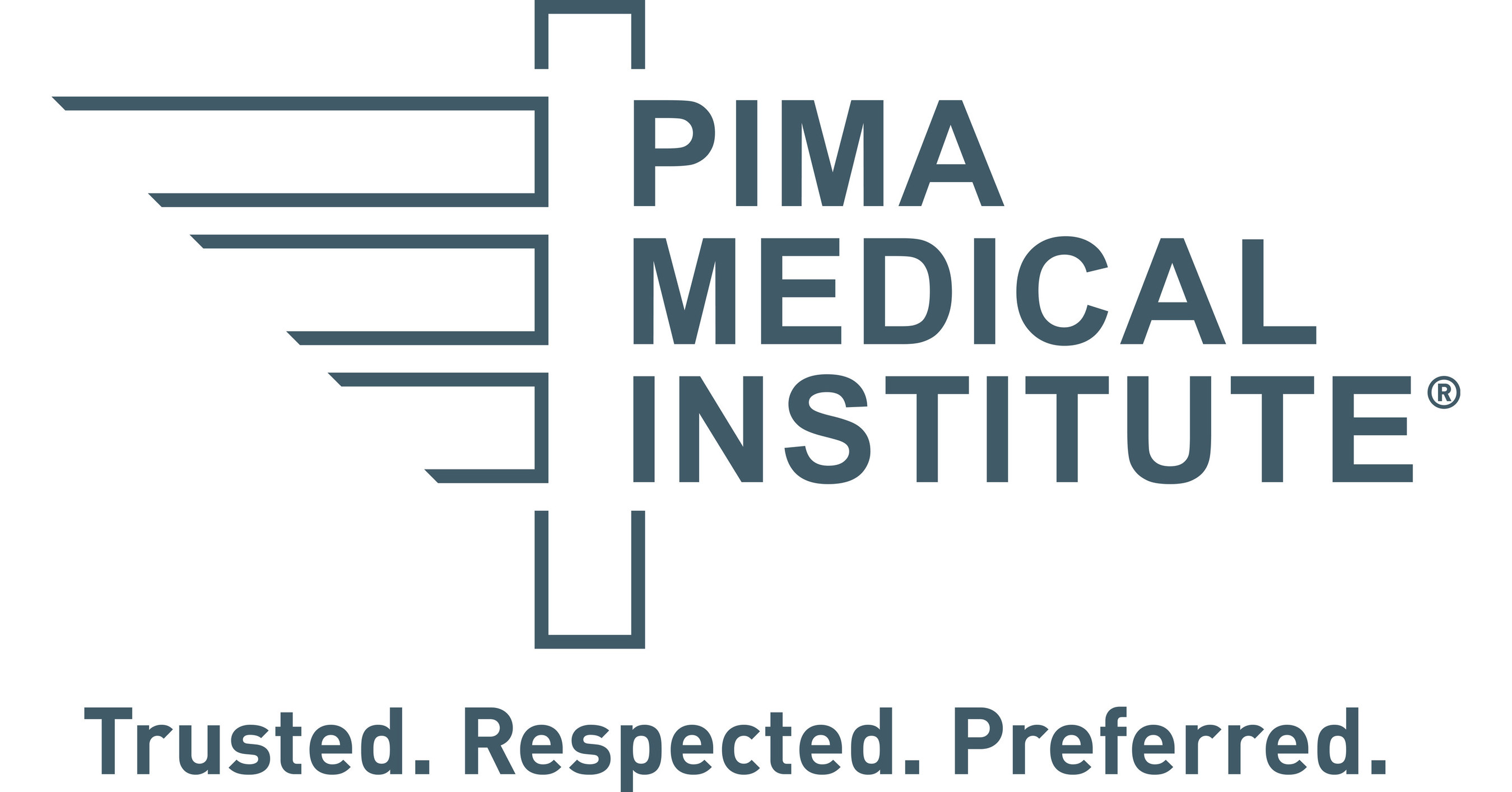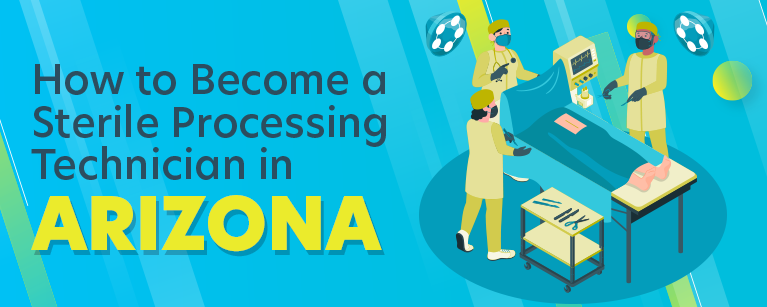If you’re interested in a career in healthcare but don’t have the means or motivation to attend full-fledged medical school, we don’t blame you.
A career in Sterile Processing could be just what you need to kickstart your new life — and you’ll get the added benefit of knowing you’re helping people as you sterilize medical tools and equipment and prepare them for surgery.
So if you live in Arizona and you’re interested in becoming an SPT, read on!
Go to Page Section:
How to Become an SPT
In Arizona, you don’t need to attend a college or university to become a Sterile Processing Technician.
However, the job market for SPTs is currently extremely competitive, so to get a leg up, you might want to consider getting officially certified.
The Healthcare Sterile Processing Association (HSPA)
You can obtain your certification through one of the HSPA’s four levels of certifications:
- Certified Registered Central Service Technician (CRCST) – the base-level certification for SPTs
- Certified Endoscope Reprocessor (CER) – an endoscope-specific certification
- Certified Instrument Specialist (CIS) – an advanced instrument certification
- Certified Healthcare Leader (CHL) – a certification for SPT management
Before you can take the official certification test, you must not only apply but also get accepted.
From there, you’ll have to study for the test itself using the content outline and reference materials provided.
Luckily, the HSPA website has a wealth of knowledge available for you to go over in preparation for your tests, from online courses to the HSPA’s Certification Handbook.
Once you pass, you’ll be certified for a full year, after which you’ll have to pay a $50 renewal fee and show that you’ve been attending continuing education courses to keep up-to-date on SP techniques.
Sterile Processing Schools in Arizona.
Arizona is a wellspring of opportunity for those looking to become an SPT.
There are several different locations that will train you in Sterile Processing techniques to prepare you for your future in the hospital or clinic of your choosing.
East Valley Institute of Technology
East Valley Institute of Technology (EVIT) offers a training program specifically for Sterile Processing that’s approved by Arizona Job Connection itself.
The program is 600 hours in total, and all you need is your high school diploma (or an equivalent) in order to qualify.
Their program qualifies for Federal Financial Aid and VA Benefits, so you can get monetary aid if you need it; the program itself costs about $6,230.00 total.
The only caveat for this option is that EVIT’s program is not currently certified by an official SP accrediting agency.
Pima Medical Institute
Pima Medical Institute offers a 9-month certificate program for Sterile Processing which covers microbiology, sterilization techniques, and storage and distribution.
Their course is specifically based on the HSPA’s CRCST certification, meaning you can take the test to be certified right after graduation!
PMI also allows their students to participate in clinical externships to get real-world experience and a leg up on their job searches.
Though some courses may be available online, the program is primarily in-person, so you must be able to attend courses on campus in order to participate in this program.
Brookline College
Brookline College offers 32-credit Sterile Processing programs at both their Tempe and Tucson campuses — and you could graduate as soon as 42 weeks after you begin.
Financial aid is available for those in need, and students will take courses to teach them about specific surgical tools, how to keep them sterile and decontaminated, and how to track and manage hospital supplies.
Graduates from the program will have the opportunity to gain additional SP certifications through the Association for the Advancement of Medical Instrumentation (AAMI).
These certifications include:
- Certified Biomedical Equipment Technician (CBET)
- Certified Radiology Equipment Specialists (CRES)
- Certified Laboratory Equipment Specialist (CLES)
Gateway Community College
Gateway Community College offers a Certificate of Completion in a Hospital Central Services program.
Though this may sound like a generalized course, graduates will have everything they need to take the test for HSPA’s CRCST certification, earning the program a place on this list!
This program includes both in-person skill labs and clinical experience to allow students to have maximum exposure to real-world hospital scenarios.
In order to be admitted to the program, you must pass a background check and comply with their clinical health and safety policy.
| School Name | Address |
|---|---|
| East Valley Institute of Technology | 1601 W. Main Street, Mesa, Arizona 85201 |
| Pima Medical Institute | 13610 N. Black Canyon Highway Phoenix , AZ 85029 |
| Brookline College - Tempe Campus | 1140 S Priest Drive Tempe, AZ 85281 |
| Brookline College - Tucson Campus | 300 S. Craycroft Rd. Suite 100 Tucson, AZ 85711 |
| Gateway Community College - Washington Campus | 108 North 40th Street Phoenix, AZ 85034 |
| Gateway Community College - Central City | 1245 East Buckeye Road Phoenix, AZ 85034 |
| Gateway Community College - 18th Street | 555 N. 18th Street Phoenix, AZ 85006 |
| Gateway Community College - Center for Entrepreneurial Innovation | 275 North GateWay Drive Phoenix, AZ 85034 |
| Gateway Community College - SouthWest Skill Center | 3000 North Dysart Road Avondale, AZ 85392 |
| Gateway Community College - Phoenix Forge | 535 West Van Buren Street Phoenix, AZ 85003 |
Salary
Curious about what an SPT actually makes?
In Arizona, you’ll make $44,179 on average, but some SPTs make over $49,000 a year!
Annual Salary Range:| Location | Avg. Annual Salary |
|---|---|
| Phoenix | $44,560 |
| Tucson | $42,790 |
| Mesa | $44,567 |
| Glendale | $44,560 |
| Scottsdale | $44,567 |
| Chandler | $44,567 |
| Tempe | $44,567 |
| Gilbert | $44,567 |
| Peoria | $44,470 |
| Yuma | $45,829 |
Regional Salary in Arizona
| Region | Employed | Avg. Annual Salary | Avg. Hourly Pay | Top 10% Annual Salary | Bottom 10% Annual Salary |
|---|---|---|---|---|---|
| Phoenix-Mesa-Chandler, AZ | 1,620 | $46,190 | $22.21 | $58,950 | $34,210 |
| Prescott Valley-Prescott, AZ | 60 | $40,110 | $19.28 | $56,460 | $31,600 |
| Tucson, AZ | 250 | $44,250 | $21.27 | $55,140 | $36,920 |
* Employment conditions in your area may vary.
Frequently Asked Questions
Will it take a long time to go to school to become a Sterile Processing Technician in Arizona?
No; in fact, many schools in Arizona have accelerated programs to prepare you for SP certification tests.
Do you need a license or secondary schooling to become a Sterile Processing Technician in Arizona?
No, you don’t need any sort of secondary schooling; however, licensed practitioners usually have better job prospects, so getting certification is recommended.
How many different schools are there for Sterile Processing in the state of Arizona?
Currently, four colleges offer SP courses or adjacent healthcare courses in Arizona.
Those colleges are:
- Pima Medical Institute
- East Valley Institute of Technology
- Brookline College
- Gateway Community College
Sterile Processing Technician Info by State
- Alabama
- Alaska
- Arizona
- Arkansas
- California
- Colorado
- Connecticut
- Delaware
- Florida
- Georgia
- Hawaii
- Idaho
- Illinois
- Indiana
- Iowa
- Kansas
- Kentucky
- Louisiana
- Maine
- Maryland
- Massachusetts
- Michigan
- Minnesota
- Mississippi
- Missouri
- Montana
- Nebraska
- Nevada
- New Hampshire
- New Jersey
- New Mexico
- New York
- North Carolina
- North Dakota
- Ohio
- Oklahoma
- Oregon
- Pennsylvania
- Rhode Island
- South Carolina
- South Dakota
- Tennessee
- Texas
- Utah
- Vermont
- Virginia
- Washington
- West Virginia
- Wisconsin
- Wyoming










